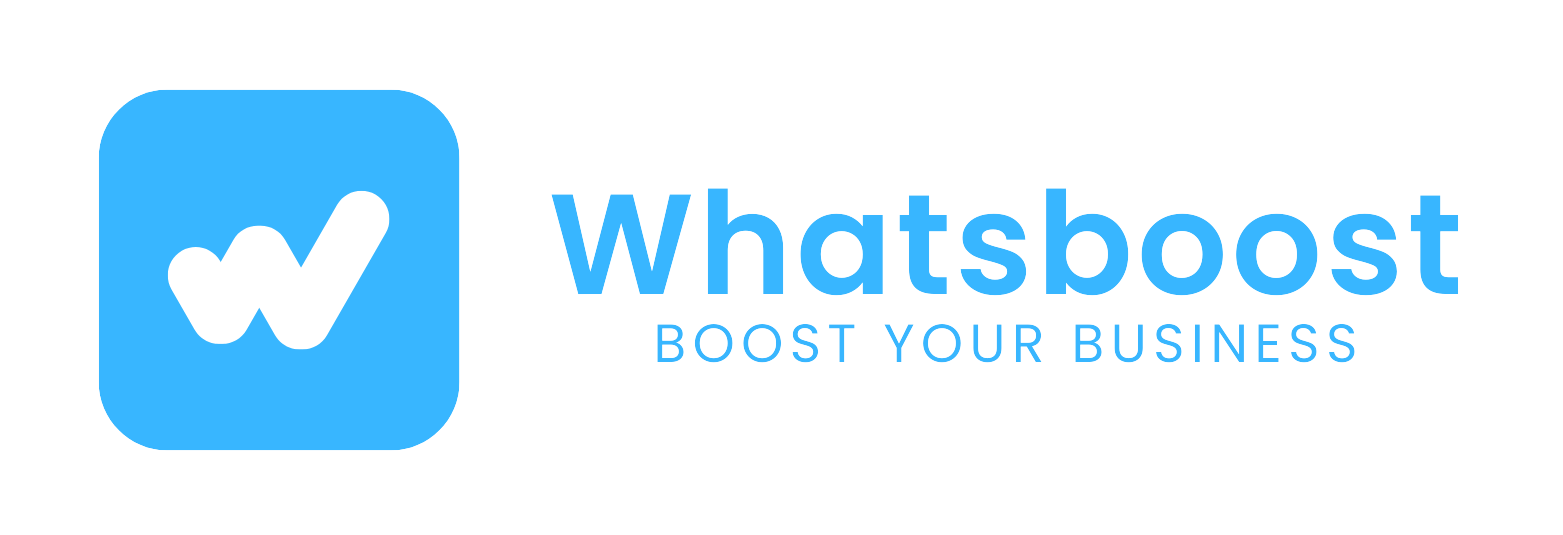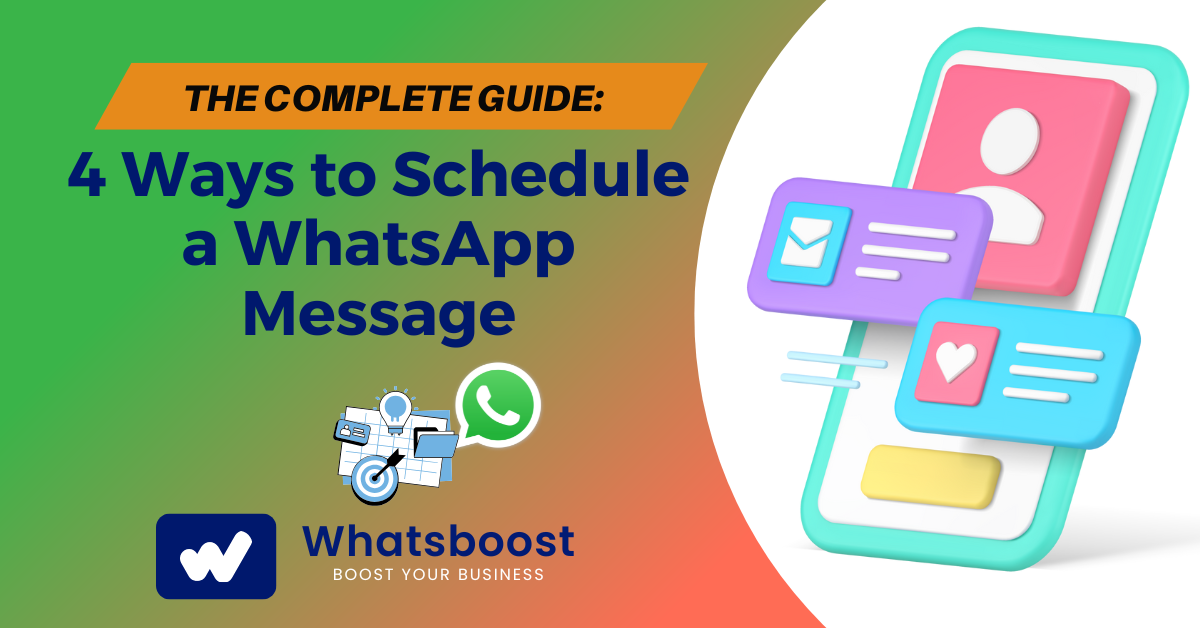Introduction: Why WhatsApp Scheduling Matters
Sometimes, we all need a little break from our phones. But the thought of missing an important message or forgetting to follow up with a customer can disrupt that much-needed downtime. That’s where WhatsApp scheduling comes in.
With the right tools and tricks, you can schedule messages on iPhone, Android, the WhatsApp Business App, or even WhatsApp Web. Whether you want to send a birthday wish at midnight, remind a customer about their appointment, or simply automate repetitive replies, different types of WhatsApp scheduling can save you time and boost efficiency.
In this blog, we’ll explore 4 easy ways to schedule WhatsApp messages, and how advanced solutions like Whatsboost can help businesses take WhatsApp automation to the next level.
Benefits of WhatsApp Scheduling
Before diving into the methods, let’s quickly go over why WhatsApp scheduling is so useful:
📌 Never miss important reminders – schedule messages for birthdays, anniversaries, or deadlines.
📌 Improve customer service – send appointment confirmations, reminders, or updates at the right time.
📌 Work-life balance – prepare messages in advance and disconnect without worry.
📌 Business efficiency – automate repetitive communication using WhatsApp Business or advanced tools like Whatsboost.
Now let’s break down the types of WhatsApp scheduling methods you can try today.
1. How to Schedule a WhatsApp Message on iPhone
iPhone users can schedule messages with Apple’s Shortcuts app.
Steps:
Open the Shortcuts app and go to the Automation tab.
Tap + and choose Create Personal Automation.
Select Time of Day → pick the date/time you want.
Tap Add Action → choose Send Message.
Type your WhatsApp message and add your recipient.
Disable “Ask Before Running” if you want the message sent automatically.
💡 Pro Tip: Keep “Ask Before Running” enabled if you want to quickly double-check or tweak the message before it goes out.
2. How to Schedule a WhatsApp Message on Android
Unlike iPhone, Android doesn’t have a built-in automation tool for WhatsApp scheduling. You’ll need a third-party app like Auto Text.
Steps:
Install Auto Text and give it the required permissions.
Tap + → choose WhatsApp.
Add the recipient and write your message.
Set the date and time for sending.
Save → the app will send it automatically at the scheduled time.
⚠️ Note: Some apps require disabling your lock screen for scheduled messages to work. To stay secure, use Android’s Smart Lock to keep your phone unlocked only in trusted places (like home or office).
3. How to Schedule a WhatsApp Message on Mobile (Using WhatsApp Business)
If you’re using WhatsApp Business, you already have access to limited scheduling features like Away Messages.
Steps:
Open WhatsApp Business → Settings.
Tap Business Tools → Away Message.
Write your auto-reply message.
Tap Schedule → choose custom time frames.
Select Recipients → either all contacts or select groups.
📌 This works best for small businesses that want to send automatic replies when they’re unavailable, but it won’t let you schedule one-off personal messages.
4. How to Schedule a WhatsApp Message on the Web
If you use WhatsApp Web (via Chrome), you can install extensions like Blueticks to unlock scheduling features.
Steps:
Install the Blueticks Chrome extension.
Log in to WhatsApp Web and set up your Blueticks account.
Open a chat → type your message → click the clock icon.
Select the date and time → click Schedule Send.
Your scheduled message will show as pending, and you can edit or cancel it before it’s sent.
Advanced WhatsApp Scheduling with Whatsboost
While these methods work for individuals and small businesses, they all have limitations. That’s where Whatsboost comes in.
Whatsboost offers professional WhatsApp integration and automation solutions that go beyond basic scheduling:
✅ Bulk WhatsApp scheduling – send thousands of scheduled messages at scale.
✅ Personalized campaigns – customize names, dates, and offers from Google Sheets data.
✅ Recurring reminders – perfect for subscription renewals or regular check-ins.
✅ CRM & workflow integration – connect WhatsApp with your sales or customer support systems.
✅ Multi-user support – let your whole team collaborate on WhatsApp.
If you’re serious about WhatsApp scheduling for business, Whatsboost is the smarter choice.
Types of WhatsApp Scheduling
To recap, here are the main types of WhatsApp scheduling:
Manual Scheduling (Shortcuts/Apps): For individuals who just want to plan personal messages in advance.
Basic Auto-Replies (WhatsApp Business): For small businesses to handle away messages.
Browser Extensions (WhatsApp Web): For casual scheduling via Chrome add-ons.
Professional Scheduling (Whatsboost): For businesses that need automation, scalability, and CRM integration.
Each option has its pros and cons, but if your goal is business growth, professional scheduling with Whatsboost ensures you’re never limited by device restrictions or app hacks.
FAQs: Types of WhatsApp Scheduling
1. Can I schedule WhatsApp messages directly in the app?
No, WhatsApp doesn’t natively support scheduling. However, you can use Shortcuts (iPhone), third-party apps (Android), or WhatsApp Business auto-replies.
2. What’s the most reliable way to schedule WhatsApp messages for business?
For businesses, Whatsboost’s WhatsApp scheduling is the most reliable. It offers bulk messaging, CRM integration, and automation that standard apps don’t.
3. Is WhatsApp scheduling safe?
Yes, but make sure you use trusted tools. With Whatsboost, your data is secure, and all messages are compliant with WhatsApp’s policies.
4. Can I schedule recurring WhatsApp messages?
Yes. With Whatsboost, you can schedule recurring subscription reminders, appointment confirmations, and marketing campaigns.
FAQs: About Whatsboost
What is Whatsboost?
Whatsboost is a WhatsApp automation and integration platform that helps businesses streamline communication, automate workflows, and send bulk or scheduled messages.
How does Whatsboost help businesses?
It allows you to manage WhatsApp across multiple users, integrate with CRMs, and automate customer engagement—all from one centralized platform.
Can I try Whatsboost before committing?
Yes, you can explore Whatsboost’s features and schedule a demo directly from Whatsboost.in.
Conclusion
WhatsApp scheduling is no longer just a convenience—it’s a necessity for anyone balancing personal communication and business efficiency. While iPhone Shortcuts, Android apps, and WhatsApp Business auto-replies provide basic solutions, professional scheduling with Whatsboost gives you the advanced automation, scalability, and reliability your business truly needs.
👉 Ready to supercharge your WhatsApp scheduling? Visit Whatsboost.in today and explore the future of automated WhatsApp messaging.

